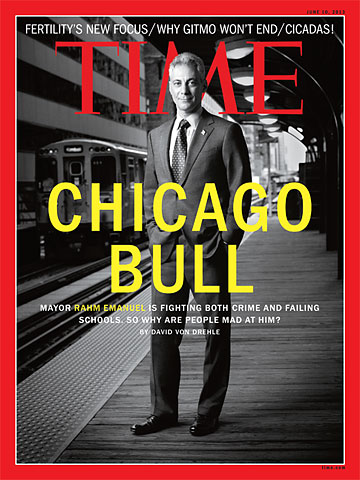
(3 of 7)
He leveled the death stare again. "You don't believe me?" But I do believe him, because Emanuel is not stupid. Arrogant, chesty, prickly, yes, but never stupid. He knew what he was getting into as mayor of Chicago and why the office is a poor stepping-stone to any other job in politics. Chicago mayors are sometimes feared, sometimes scorned, sometimes investigated--but almost never promoted.
The Impossible Politics of Crime
Nothing has been more difficult than the surge of street violence during the mayor's first full year in office. The number of murders in Chicago climbed past 500 in 2012 for only the second time since 2004--and turned a near coronation of the celebrity mayor into a baptism of fire.
Emanuel had taken over a city where crime rates fell gradually and steadily over more than a decade, mirroring a national trend--but they had not fallen as much as in some other major cities. While Chicago cut its murder rate in half from a peak in the 1990s, New York City managed to cut its murder rate by three-quarters and Los Angeles by two-thirds. The difference is more than 100 lives per year.
The problem is rooted, troublingly, in a relative few South Side and West Side neighborhoods where the legacy of segregation, police corruption, failed schools and misguided public-housing policy can be seen in concentrated pockets of family dysfunction and violence among young black men. Three percent of the city's real estate is the source of 20% of its homicides; at the same time, 40% of Chicago, mostly on the North Side, experienced no murders at all last year, according to city officials.
During the younger Daley's long reign, the city demolished such notorious high-rise poverty traps as the Robert Taylor Homes and Cabrini-Green, but these overdue steps had the perverse effect of scattering crime and gang activity into previously stable middle-class neighborhoods. At the same time, Chicago police were slow to embrace the revolution in anticrime tactics that helped tame the mayhem of other cities.
On taking office, Emanuel moved quickly to hire a new superintendent of police. He picked Newark, N.J., police commissioner Garry McCarthy, a Bronx-born veteran of the New York City police and a disciple of the law-enforcement guru William Bratton. As the officer in charge of New York's CompStat system of data-driven policing for seven years, McCarthy was revolutionary to the core, but with the streetwise demeanor of a beat cop.
McCarthy told me in a recent interview that he and the mayor shared a vision of a "proactive" force, which meant more officers on the street to gather more information about bad actors and simmering conflicts. It did little good to respond after a crime was committed when a more aggressive approach might prevent crime before it happens. To accomplish this, the department would have to be reorganized around new district commanders loyal to the vision. "He promised that I could run the department and he would take care of the politics, because if you want performance from a police department, you have to take the politics out of it," McCarthy says.
